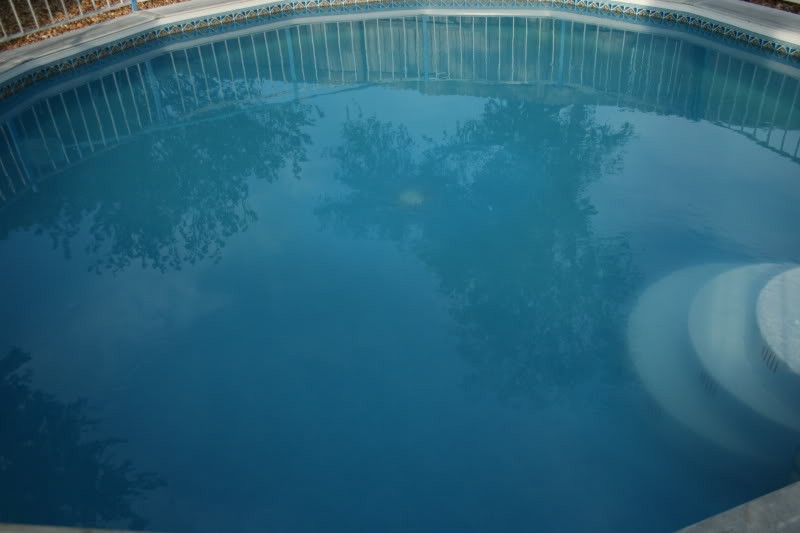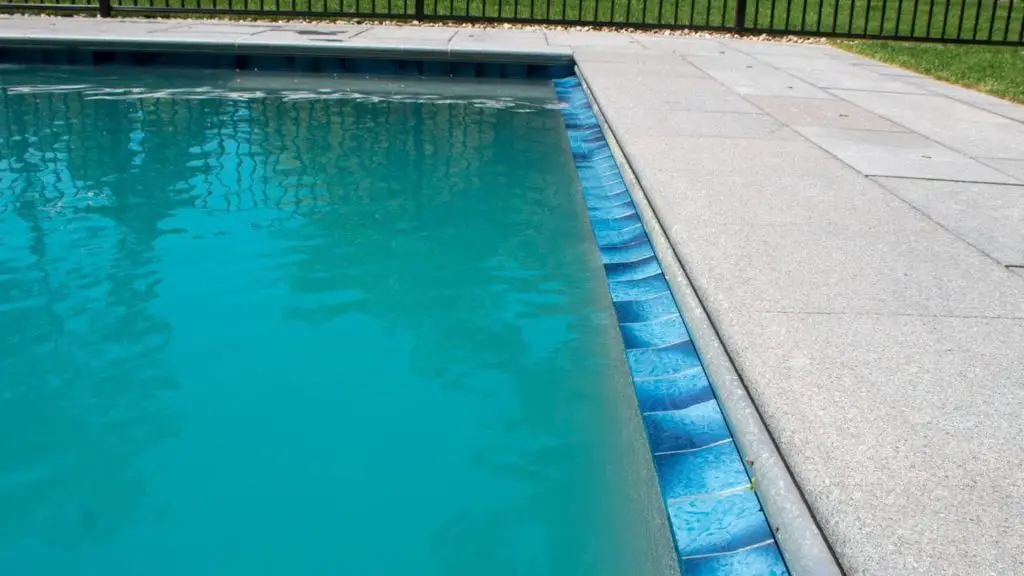Your pool may be cloudy due to imbalanced pH levels or inadequate filtration and circulation. This can lead to the accumulation of debris, algae growth, or inadequate chlorine levels, affecting water clarity.
A cloudy pool can be frustrating and unappealing to swim in. It can also indicate underlying issues that need to be addressed to maintain a safe and enjoyable swimming experience. We will explore the common causes of cloudy pool water and provide practical solutions to help you restore the pristine condition of your pool.
By understanding the root causes, you can take appropriate actions to clear up the cloudiness and get back to enjoying crystal clear waters. Let’s dive in and uncover the reasons behind your cloudy pool.

Credit: www.homedepot.com
Understanding Cloudy Pool Water
Cloudy pool water can be a frustrating issue for pool owners. Discover the reasons behind a cloudy pool and how to clear it up effectively.
Understanding Cloudy Pool Water Having a cloudy pool can be frustrating, leaving you wondering why your once crystal-clear water has turned into a murky mess. Cloudy water is a common nuisance for pool owners and can be caused by various factors like imbalanced chemicals, poor filtration, or an excess of organic debris.
Causes Of Cloudy Water
Several factors can lead to a cloudy pool. Poor circulation, unbalanced pH and alkalinity levels, insufficient chlorine, and high levels of dissolved minerals are common culprits. Additionally, organic contaminants such as leaves, pollen, and algae can also cause cloudiness. Understanding these root causes is crucial in determining the best course of action to restore your pool’s clarity.
Effects Of Cloudy Water
Cloudy pool water not only affects the aesthetics of your pool but can also pose a health risk to swimmers. Reduced visibility in the water increases the chances of accidents, while the presence of harmful bacteria and pathogens can lead to skin and eye irritation or even more serious health issues if left untreated. Addressing the cloudy water promptly is essential to ensure a safe and enjoyable swimming experience for everyone.
Common Reasons For Cloudy Pool Water
Cloudy pool water can be caused by several factors, including poor filtration, improper water balance, and the presence of algae or debris. Regular maintenance and proper chemical levels can help keep your pool water clear and inviting.
Improper Ph Levels
Unbalanced pH levels can lead to cloudy pool water. High pH causes minerals to precipitate, creating cloudiness, while low pH can corrode metal fittings and turn pool water cloudy.
Lack Of Chlorine
Inadequate chlorine levels can result in cloudy pool water due to the accumulation of organic contaminants. Without sufficient chlorine, these contaminants cannot be effectively oxidized, leading to cloudiness.
Algae Growth
The presence of algae in the pool can cause it to become cloudy. Algae growth thrives in warm, stagnant water, and its presence can result in a green or yellow tinge to the water.
Poor Filtration System
A faulty or inadequate filtration system can fail to effectively remove particles causing cloudiness. Insufficient filtration allows particles to remain suspended, contributing to the pool’s cloudy appearance.
Unusual Causes Of Cloudy Pool Water
Discover the unusual causes of cloudy pool water beyond the common culprits, uncovering factors that lead your pool astray. From imbalanced pH levels to ineffective filtration, explore the hidden reasons behind the murky veil in your pool.
Presence Of Metals
Metallic ions like copper or iron can infiltrate pool water through various sources, leading to cloudiness. Metallic ions are commonly introduced through corrosion of pool equipment or from metal-based pool treatments.
High Calcium Hardness
Excess calcium levels in pool water can cause cloudiness, especially in areas with hard water. High calcium hardness often stems from the water source used to fill the pool and can result in cloudy water.
Impact On Pool Equipment And Swimmers
Cloudy pool water can have a negative impact on the pool’s equipment and swimmers. It can cause damage to pool filters and pumps, leading to costly repairs. Additionally, cloudy water can also pose health risks to swimmers, as it may indicate the presence of harmful bacteria and algae.
Regular maintenance and proper chemical balance can help prevent cloudy pool water and ensure a safe and enjoyable swimming experience.
Corrosion Of Equipment
One of the main concerns posed by a cloudy pool is the potential impact on the pool equipment. When the pool water becomes cloudy, it often indicates a chemical imbalance or the presence of contaminants. This can lead to corrosion of your pool equipment such as pumps, filters, and heaters.
Corrosion occurs when the cloudy water contains high levels of corrosive substances such as algae, bacteria, or excessive metals like iron or copper. These substances can attack the metal components of your pool equipment, causing them to deteriorate over time.
When the equipment is corroded, it can lead to leaks, reduced performance, and ultimately, costly repairs or replacements. The corrosion can compromise the effectiveness and efficiency of the equipment, affecting the overall functionality of your pool.
Skin Irritation
Cloudy pool water not only affects the equipment but also poses a risk to the health and well-being of swimmers. One common issue associated with cloudy water is skin irritation. When the water is cloudy, it is often a breeding ground for bacteria, viruses, and other microorganisms that can cause skin problems.
The presence of contaminants, such as excessive chlorine or combined chlorine (chloramines), can irritate the skin and eyes of swimmers. This can result in itching, rashes, redness, and even more severe reactions for individuals with sensitive skin or pre-existing skin conditions.
Furthermore, cloudy water hinders the effectiveness of chlorine in killing bacteria and maintaining proper disinfection levels. This can lead to an increased risk of waterborne illnesses and infections.
To ensure a safe and comfortable swimming experience, it is crucial to address the cloudiness of your pool water promptly. By maintaining proper water chemistry and utilizing effective filtration systems, you can prevent corrosion of equipment and protect the health of swimmers.
For more information on how to clear your cloudy pool water and prevent these issues, check out our other blog posts on pool maintenance and water treatment.
Testing And Identifying The Issue
To determine the cause of a cloudy pool, it is essential to conduct thorough testing and identification of the issue. Testing the water for imbalances in pH, alkalinity, and chlorine levels can help pinpoint the underlying problem, allowing for targeted and effective treatment to achieve crystal clear water.
`water Testing Kits`
Professional Pool Inspection
Testing and Identifying the Issue: One of the primary steps in determining the cause of a cloudy pool is utilizing water testing kits. These kits allow you to check essential parameters such as pH levels and chlorine content. By conducting professional pool inspection, experts can help identify complex issues beyond simple testing kits, providing a comprehensive assessment.
Smart Solutions To Clear Cloudy Water
Cloudy pool water is a common problem that can be caused by various factors such as imbalanced pH levels, inadequate filtration, or the presence of algae. Fortunately, there are smart solutions to help you restore your pool water to its sparkling clarity. By adjusting pH and alkalinity, shocking the pool, using algaecide, and improving filtration, you can effectively clear the cloudy water and ensure a pristine swimming environment.
Adjusting Ph And Alkalinity
Maintaining the proper pH and alkalinity levels is crucial for water clarity. Use a reliable pool testing kit to measure the levels and make necessary adjustments. Ideally, the pH should be kept between 7.4 and 7.6, and the total alkalinity between 80 and 120 parts per million (ppm).
Shocking The Pool
Pool shocking involves adding a concentrated dose of chlorine to kill bacteria, algae, and other contaminants. This process helps to oxidize the water and break down organic matter that may be causing cloudiness. Ensure proper ventilation and wait for the chlorine levels to return to normal before use.
Using Algaecide
If algae are the culprit behind the cloudy water, using an algaecide can effectively combat their growth. Select a suitable algaecide and follow the manufacturer’s instructions for application. Regularly scrubbing the pool walls and floor can also help eliminate algae and prevent further cloudiness.
Improving Filtration
A well-functioning filtration system is essential for maintaining clear water. Perform regular backwashing and cleaning of the filter to ensure optimal efficiency. Consider upgrading to a high-quality filter if necessary to improve the overall filtration process. Circulating the water for a longer duration can also help in removing debris and improving water clarity.
Preventive Measures For Crystal-clear Water
Discover preventive measures to achieve crystal-clear water in your pool. Uncover the reasons behind cloudy pool water and learn how to prevent it effectively.
`regular Maintenance Schedule`
`proper Water Chemistry Balance`

Credit: www.taylortechnologies.com

Credit: deependpools.co.uk
Conclusion
Cloudy pool water can be a frustrating issue but understanding the causes is key. Maintain pH levels and sanitize regularly to keep your pool water crystal clear. By following these simple tips, you can enjoy a sparkling clean pool all season long.
Keep your pool clear and inviting!





